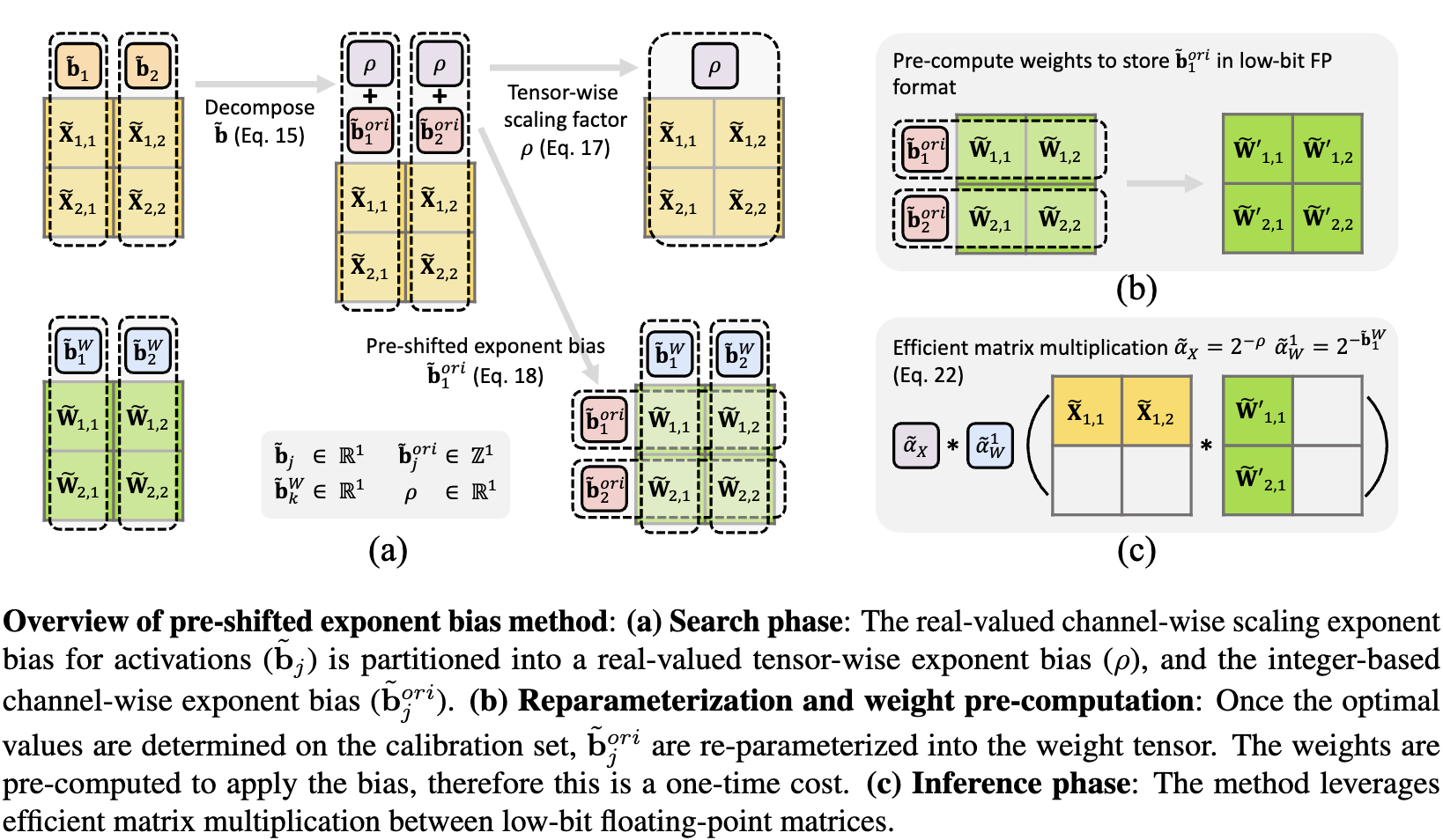This is the pytorch implementation of our paper LLM-FP4: 4-Bit Floating-Point Quantized Transformers, published in EMNLP 2023 main conference. LLM-FP4 is able to quantize both weights and activations in large language models (LLMs) down to 4-bit floating-point values, in a post-training manner. The methods includes (1) a search-based framework for determining the optimal exponent bias and maximal quantization value; (2) pre-shifted exponent bias, which effectively addresses the challenge of high inter-channel variance in transformers.
- Install dependencies
pip install -r requirements.txt- Model Used:
MODEL_ADDR=huggyllama/llama-7bMODEL_ADDR=huggyllama/llama-13bRefer to ./quant_layers/* for FP quantization simulation
Refer to ./utils/quant_calib.py for FP quantization calibration detail
Refer to ./complete_scripts/* for the complete scripts to reproduce the results reported in the paper
This file contains the code to perform FP-PTQ calibration and evaluation. User can specify different quantization configuration to obtain different quantized model and evalute the quantized model with commonsense reasoning tasks.
Example usage for multiple GPUs:
export CUDA_VISIBLE_DEVICES=0,1
MODEL_ADDR=huggyllama/llama-7b
python main.py --model hf-causal-experimental --model_args pretrained=$MODEL_ADDR,use_accelerate=True \
--tasks arc_challenge,arc_easy,boolq,hellaswag,openbookqa,piqa,winogrande --device cuda --batch_size auto \
--no_cache --num_fewshot 0 --quant_config 'FPQ_config_llama' --qbits 4 4 4 2 2 2 --calib_size 32 --search_round 3 \
--search_intervals 0.01 1.2 100The search results a.k.a the quantization parameters will be saved under ./search_result after the calibration is done.
To evaluate the performance of the quantized model on the commonsense reasoning tasks, first get the path of the quantization parameters and use the following command:
export CUDA_VISIBLE_DEVICES=0,1
MODEL_ADDR=huggyllama/llama-7b
python main.py --model hf-causal-experimental --model_args pretrained=$MODEL_ADDR,use_accelerate=True \
--tasks arc_challenge,arc_easy,boolq,hellaswag,openbookqa,piqa,winogrande --device cuda --batch_size auto \
--no_cache --num_fewshot 0 --quant_config 'FPQ_config_llama' --qbits 4 4 4 2 2 2 --only_eval \
--ptq_param_path "./search_result/FPQ_config_llama/W4A4E4_search_round3_search_intervals(0.01,1.2,100).pt"Below is the results in LLaMA-7B and LLaMA-13B with six commonsense reasoning datasets.
| Quant Method | #Bits (E/W/A) | #Calib | BoolQ | PIQA | HellaSwag | WinoGrande | ARC-e | ARC-c | Average |
|---|---|---|---|---|---|---|---|---|---|
| LLaMA-7B Full-precision | 16/16/16 | - | 75.1 | 78.7 | 56.9 | 69.9 | 75.3 | 41.9 | 66.3 |
| MinMax INT Quant | 4/4/4 | 32 | 54.1 | 51.7 | 25.6 | 49.8 | 24.7 | 22.9 | 38.1 |
| MinMax FP Quant (E2M1) | 4/4/4 | 32 | 47.3 | 53.1 | 25.7 | 50.7 | 25.1 | 22.4 | 37.4 |
| SmoothQuant (Xiao et al., 2022) | 16/4/4 | 512 | 54.1 | 62.8 | 41.5 | 52.6 | 50.6 | 32.9 | 49.1 |
| LLM-QAT (Liu et al., 2023) | 16/4/4 | (QAT) | 63.5 | 64.3 | 55.6 | 52.9 | 50.3 | 30.2 | 52.8 |
| FPQ baseline | 4/4/4 | 32 | 57.4 | 56.6 | 30.2 | 51.1 | 37.7 | 23.2 | 42.7 |
| FPQ | 4/4/4 | 32 | 64.2 | 73.5 | 47.8 | 63.7 | 65.9 | 33.6 | 58.1 |
| Quant Method | #Bits (E/W/A) | #Calib | BoolQ | PIQA | HellaSwag | WinoGrande | ARC-e | ARC-c | Average |
|---|---|---|---|---|---|---|---|---|---|
| LLaMA-13B Full-precision | 16/16/16 | - | 77.9 | 79.2 | 59.9 | 72.6 | 77.4 | 46.4 | 68.9 |
| MinMax INT Quant | 4/4/4 | 32 | 54.5 | 52.7 | 25.5 | 51.1 | 25.3 | 22.1 | 38.5 |
| MinMax FP Quant (E2M1) | 4/4/4 | 32 | 45.8 | 51.7 | 25.5 | 49.5 | 25.0 | 22.8 | 36.7 |
| SmoothQuant (Xiao et al., 2022) | 16/4/4 | 512 | 57.6 | 61.3 | 56.0 | 52.6 | 49.9 | 25.1 | 50.4 |
| FPQ baseline | 4/4/4 | 32 | 54.3 | 57.7 | 35.7 | 52.2 | 41.1 | 25.7 | 44.5 |
| FPQ | 4/4/4 | 32 | 71.9 | 74.8 | 53.3 | 66.7 | 71.7 | 39.9 | 63.1 |
If you use LLM-FP4 in your publication, please cite it by using the following BibTeX entry.
@misc{liu2023llmfp4,
title={LLM-FP4: 4-Bit Floating-Point Quantized Transformers},
author={Shih-yang Liu and Zechun Liu and Xijie Huang and Pingcheng Dong and Kwang-Ting Cheng},
year={2023},
eprint={2310.16836},
archivePrefix={arXiv},
primaryClass={cs.CL}
}We greatly appreciate the contributions of three remarkable repositories: FP8 Quantization: The Power of the Exponent, PTQ4ViT, Language Model Evaluation Harness. These projects have significantly benefited our work.
